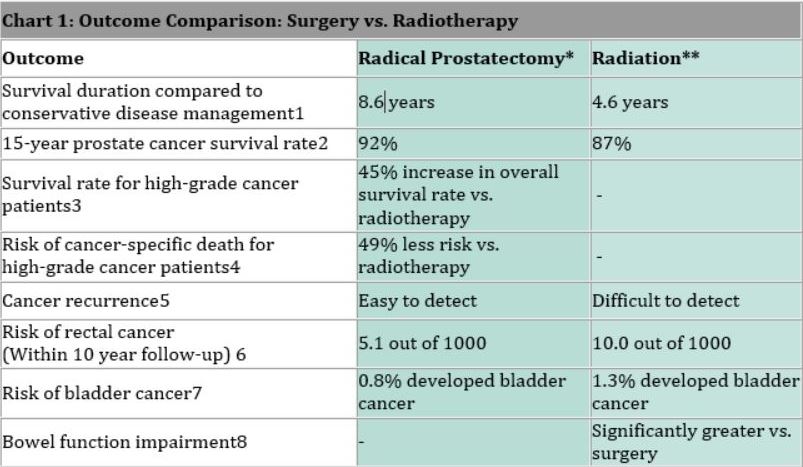7 Easy Facts About Best Prostate Cancer Hospital In India Shown
7 Easy Facts About Best Prostate Cancer Hospital In India Shown
Blog Article
Prostate Cancer Cells Therapy: Surgical and Non-Surgical Approaches Explained
When confronted with a prostate cancer cells medical diagnosis, the range of therapy choices can seem overwhelming. From medical treatments to non-surgical approaches, each method lugs its own set of factors to consider and benefits. The decision-making procedure involves weighing variables such as effectiveness, potential side impacts, and long-term results. Understanding the nuances of medical techniques, like robotic-assisted surgery, and non-surgical treatments such as radiation therapy and hormonal agent treatment, is critical for clients and their families. This detailed review aims to clarify the complexities of prostate cancer cells treatment, providing understandings right into the ins and outs of each approach to equip individuals in making notified choices concerning their health and wellness.
Surgical Therapy Choices
When thinking about surgical therapy choices for prostate cancer, clients and health care companies typically evaluate the advantages and dangers related to different procedures. One common surgical strategy is extreme prostatectomy, which includes the elimination of the whole prostate gland. This treatment is frequently recommended for patients with local prostate cancer and supplies the capacity for a cure. Radical prostatectomy can lead to side effects such as urinary incontinence and erectile disorder.
One more medical option is robotic-assisted laparoscopic prostatectomy, a minimally intrusive treatment that makes use of a robotic system to help the surgeon in eliminating the prostate. This method can result in less blood loss, much shorter medical facility stays, and quicker recuperation times contrasted to standard open surgical procedure. It also lugs the danger of issues such as infection and injury to surrounding body organs.
Eventually, the choice of medical treatment for prostate cancer cells relies on various factors including the stage of the cancer cells, the person's total health and wellness, and their choices regarding prospective adverse effects and recovery times. Consulting with a multidisciplinary group consisting of urologists, oncologists, and radiation oncologists can aid people make notified decisions concerning the most ideal medical approach for their private instance.

Non-Surgical Treatment Choices
Thinking about alternatives to surgical treatments, non-surgical treatment choices for prostate cancer cells deal patients additional methods for managing the condition while decreasing possible surgical dangers. One non-surgical strategy is Energetic Security, where patients with low-risk prostate cancer cells are checked closely with regular examinations, blood examinations, and biopsies, without undergoing prompt treatment. This method intends to stay clear of unnecessary treatment and its associated negative effects, such as urinary incontinence and impotence.
One more non-surgical choice is Radiation Therapy, which utilizes high-energy rays to eliminate cancer cells (best prostate cancer doctor). This treatment can be provided on the surface making use of an equipment (External Beam Radiation) or inside via little radioactive pellets placed near the growth (Brachytherapy) Radiation treatment can be made use of as a primary treatment or in mix with other therapies, such as hormone treatment
Additionally, Hormonal Agent Therapy is a non-surgical approach that intends to decrease the degrees of male hormones (androgens) in the body, as these hormones can fuel the development of prostate cancer cells. By obstructing or reducing androgen degrees, hormonal agent treatment can reduce cancer development and alleviate signs in advanced instances.
Robotic-Assisted Surgical Procedure for Prostate Cancer

One of the key benefits of robotic-assisted surgery for prostate cancer is its capacity to decrease the threat of issues and side impacts typically connected with open surgical procedure, such as blood loss, pain, infection, and extended recovery times. Patients undertaking robotic-assisted procedures frequently experience shorter health center keeps, less postoperative pain, and faster go back to regular activities. In addition, the minimally intrusive nature of robot surgical treatment generally results in smaller cuts, causing boosted cosmetic end results and minimized scarring for clients. Overall, robotic-assisted surgical procedure represents a cutting-edge strategy to prostate cancer cells therapy that incorporates technological innovations with surgical know-how to optimize person end results.
Radiation Treatment for Prostate Cancer
Utilizing innovative radiation technology, radiation therapy plays a vital duty in the comprehensive treatment of prostate cancer. Radiation therapy uses high-energy radiation to ruin cancer cells and shrink growths. It is a common treatment alternative for prostate cancer cells, either as a main therapy or in mix with surgical procedure, hormonal agent therapy, or chemotherapy.
There are two primary types of radiation treatment utilized for prostate cancer cells: outside beam radiation treatment (EBRT) and brachytherapy. In EBRT, an equipment provides radiation from outside the body to the prostate. This therapy is usually offered over a number of weeks, with day-to-day sessions lasting just a few minutes (best prostate cancer doctor). Brachytherapy involves placing radioactive seeds or sources directly into the prostate near the malignant cells. These seeds emit radiation that kills the cancer cells in time.
Radiation treatment for prostate cancer is very effective, with high cure prices, particularly for local cancer cells. It is also a valuable choice for individuals that might not be ideal prospects for surgical procedure. Like any therapy, radiation treatment may have adverse effects, such as urinary troubles, exhaustion, and skin irritation, however these are workable and usually short-term.
Hormonal Agent Therapy for Prostate Cancer
Hormonal agent therapy is a generally utilized treatment strategy for prostate cancer cells administration. Hormonal agent treatment, additionally known as androgen deprival therapy, intends to lower testosterone degrees in the body or block the hormonal agent's impacts on the prostate cancer cells, thus reducing down the illness's development.
There are various kinds of hormone treatment for prostate cancer, including medications that reduced testosterone levels (such as luteinizing hormone-releasing hormone agonists and villains), or drugs that block testosterone from reaching cancer cells (like anti-androgens) Hormonal agent therapy can be redirected here used alone or Read More Here in combination with various other therapies like radiation therapy, relying on the phase and have a peek at this site aggression of the cancer cells.
While hormone therapy can successfully regulate prostate cancer growth, it might include side results such as warm flashes, loss of libido, impotence, and osteoporosis - Best prostate cancer hospital in India. Normal monitoring and conversations with healthcare companies are critical to manage these negative effects and guarantee the therapy's effectiveness
Verdict
To conclude, the treatment alternatives for prostate cancer consist of non-surgical and surgical approaches such as robotic-assisted surgical treatment, radiation therapy, and hormone treatment. Each approach has its very own benefits and threats, and the option of treatment depends upon numerous aspects such as the stage of cancer and overall health of the client. It is very important for people to talk about these options with their healthcare provider to figure out one of the most appropriate strategy for their specific situation.

Utilizing innovative radiation modern technology, radiation treatment plays a vital role in the comprehensive treatment of prostate cancer. It is a typical treatment alternative for prostate cancer cells, either as a primary therapy or in combination with surgical treatment, hormone treatment, or radiation treatment.
Radiation treatment for prostate cancer cells is extremely efficient, with high cure prices, specifically for localized cancer.Hormone therapy is a generally utilized therapy strategy for prostate cancer administration.In final thought, the treatment choices for prostate cancer cells include medical and non-surgical approaches such as robotic-assisted surgery, radiation therapy, and hormonal agent therapy.
Report this page